#honestly seeing the huge lear statue for the first time was something else
Explore tagged Tumblr posts
Text




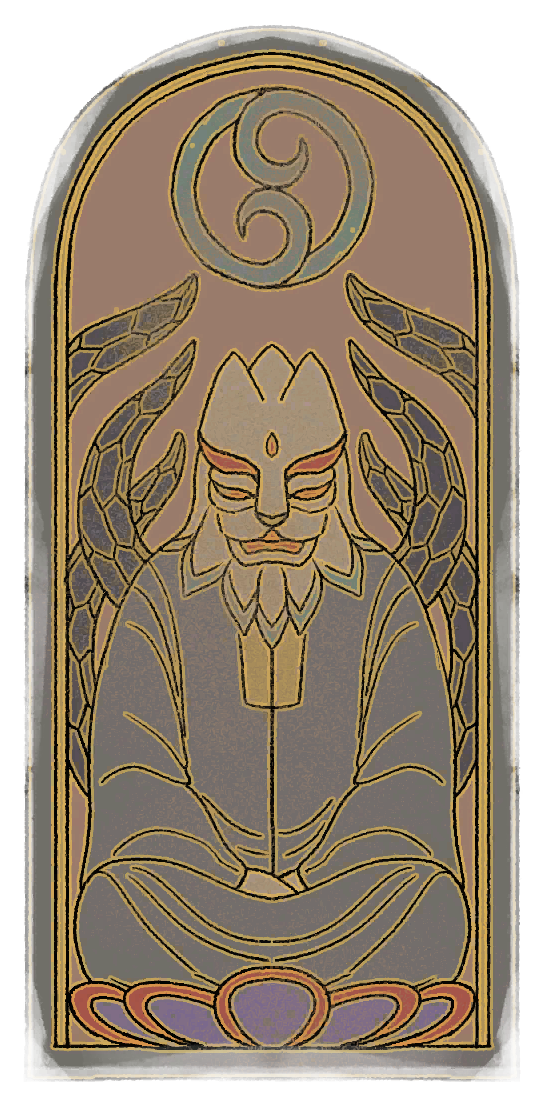
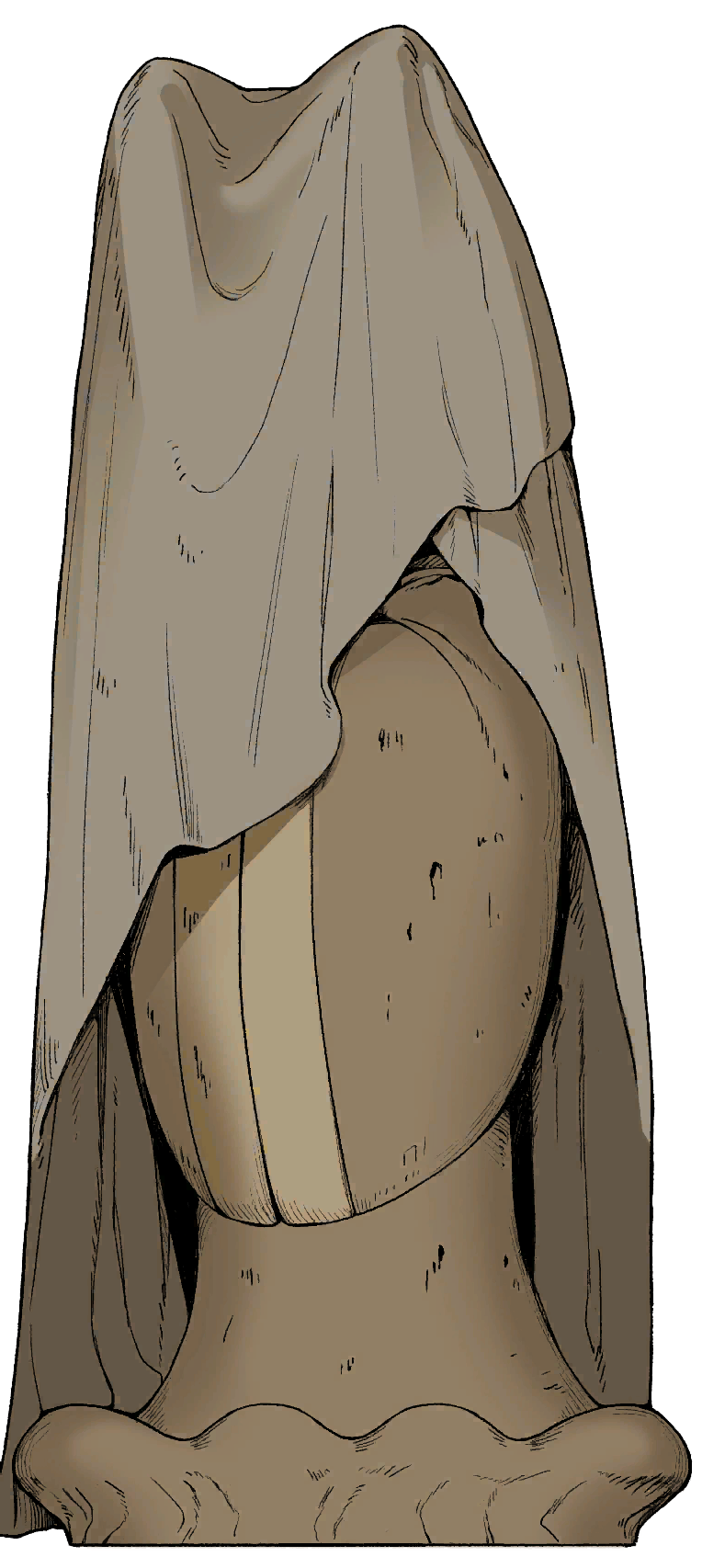
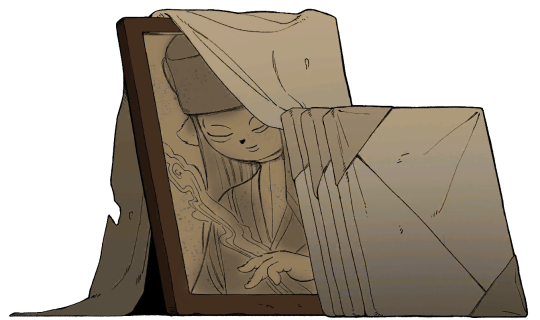
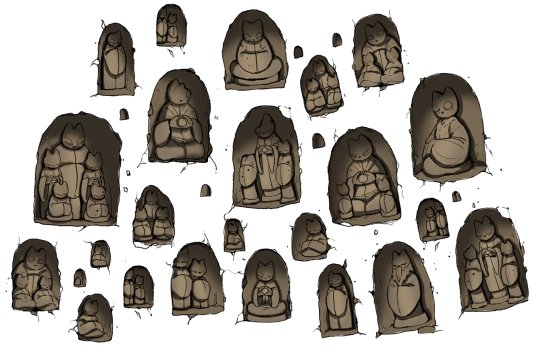


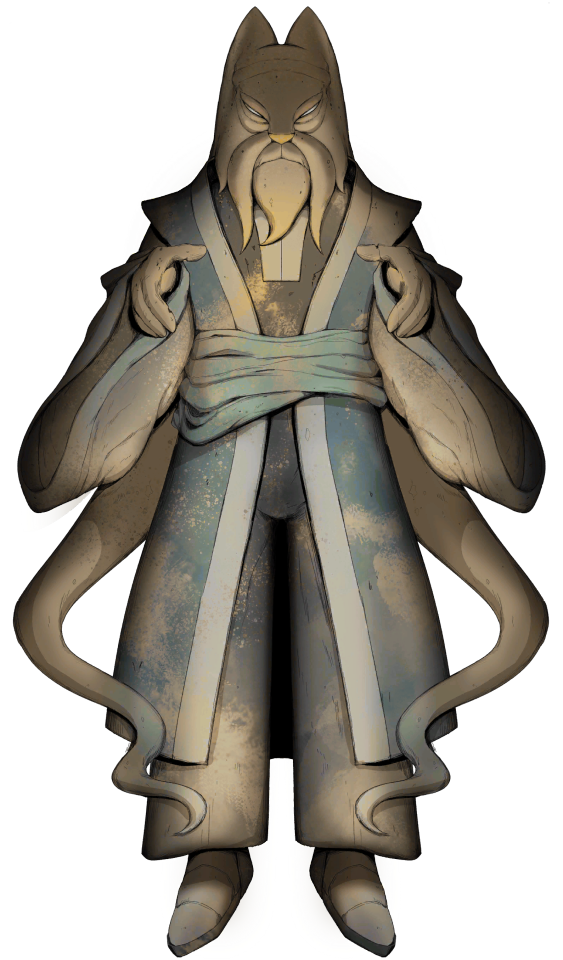

Today's addition to my Nine Sols png collection: Grotto of Scriptures (part 1)
#nine sols#lear nine sols#nine sols lear#originally i was looking for the murals with yin jifu guiguzi and luyan but got a bit distracted#GOS might just be my favorite zone in the whole game#honestly seeing the huge lear statue for the first time was something else#ji nine sols#nine sols ji
100 notes
·
View notes
Text
How to stage King Lear so that Edmund’s 100% more sympathetic and Gloucester’s 100% more of a jerk
( the prequel )
( the sequel )
(This is 100% about Edmund. If you wanna read stuff about other characters then this isn’t the post for you)
(Seriously this isn’t about anyone other than Edmund)
(This is your final warning- enjoy!)
(Or don’t I don’t care I’m really tired and I have midterms to study for)
General Staging
-every time Edmund and Gloucester are on stage together, they gravitate away from each other. Kinda like what happens when you try to push two magnets together. If one takes a step towards the other, the other moves away.
-Gloucester rarely ever looks at Edmund. He often walks in front of him when both are walking together. In scenes where a three way conversation is taking place between himself, Edmund, and someone else, he looks at the other person the whole time.
-Edmund faces away from people when he’s lying to them. Often by standing in front of them (but like, across the stage from them so the audience can see them both) (like this—->)
(I deleted the picture accidentally this is not ok now I have to draw it again)

Casting/ Costumes
-(I’m only gonna be talking about the characters that I actually care about how they’re cast)
-Edmund: someone of average height, yet shorter than Gloucester, Edgar, and Cornwall. Around the same height as Albany and Goneril. Taller than Regan. Is attractive (obviously. That’s one of the first things we’re told about him), but leaning more towards cute than hot (as per my analysis in a previous post). Wears shades of grey- all of his costumes make it clear that he’s upper class, but they’re not overly flashy.
-Gloucester: If I get even one Santa Claus vibe, I’m gonna punch a wall. He should have zero resemblance to Santa. I just saw a production of Lear where he may as well have been a mall Santa. I wanted to scream. Anyway. Onto what he should look like. I honestly don’t care, as long as i can’t mistake him for Santa. It’s the vibe that counts. ANYWAY. His costume is obnoxiously ostentatious, but it gets gradually more normal as the overall stress level increases.
-Edgar: taller than Edmund, and physically more muscular, but in like “Disney channel movie football player side character who’s no one’s primary love interest and is kinda dumb” sort of way. (Future Edette Editing: What I meant was “he’s a himbo”) He’s not ultra hot, but he’s not exactly ugly either. He’s pretty average looking. He wears shades of brown, because I feel like that suits him.
-Cornwall: tall but doesn’t give off Tall Person Vibes. Preferably with dark brown or black hair, but other colors can work as well. I cannot imagine him wearing anything other than suits that are mostly black with some shades of red somewhere- I don’t care how you incorporate the shades of red into his costume, as long as they’re there.
-Albany: has a dark shade of blond hair, or a medium shade of brown hair. Any other hair color just doesn’t work. (Future Edette Editing: any color hair other than black is fine for Albany). Dresses sensibly and wears really boring costumes.
-Goneril, Regan, and Cordelia have at least a little bit of a family resemblance. Please. Their costumes are similar as well- all wear standard types of clothes you’d expect the princesses of England to wear.
ACT 1 SCENE 1
- Gloucester and Kent enter the stage with Edmund trailing behind them. They’re entering the palace from outside. Idk how England’s weather works, but I decided that the whole play takes place in the fall. I’m not wrong. It does. It doesn’t feel like the sort of play to take place in any other season. You can all fight me on this in the comments, I have no evidence to back up this claim. Anyway, they’re all wear jackets. Because it’s fall.
-As Kent and Gloucester say their first lines, they take their jackets off. It’s hot inside the palace. Edmund leaves his jacket on. It’s not a heavy jacket. He’ll be fine.
-As Gloucester finishes up his first line “...can make choice of either’s moiety” he hands his jacket to Edmund. He does this in a very natural way- it’s clear this is something he does instinctively, without thinking about it. Edmund takes it. He takes it instinctively as well, without thinking about it.
-Kent, watching this says the line “Is not this your son, my lord?”. As in “hey dude. Isn’t he your kid? Why are you treating him like a servant or a coatrack?”
-at “His breeding, sir, hath been at my charge”, Gloucester puts a hand on Edmund’s shoulder in a “yes this is my son” sort of way. He does that a bit too roughly- not in any attempt to hurt Edmund, but definitely showing that he’s doing it for show and not in genuine fatherly affection.
-While Gloucester talks about Edmund, a waiter goes around with champagne glasses. Maybe they have actual liquid (ie water) in them, maybe not. I don’t care. Anyway, both Gloucester and Edmund take one.
-As Gloucester continues talking, he slowly sips whatever alcoholic beverage is in the champagne glass. (Probably champagne, but hey, I’m no expert on alcohol). NO, this isn’t to imply that he’s only speaking Like That (TM) because he’s drunk. He is not drunk.
-meanwhile Edmund downs the whole glass, in the standard theatre way of “I don’t wanna be here and I don’t wanna deal with this”
-Gloucester hands his empty glass to Edmund. He seems to suddenly remember that Edmund is, in fact, there. He says him line “Do you know this noble gentleman, Edmund?”
-At “my services to your lordship” he would bow or something (I don’t know English nobility etiquette, sorry), but he’s currently holding two glasses and a jacket, so he partially bows to the best of his ability.
ACT 1 SCENE 2
- A main set piece for this play would be a door or two on wheels that can be moved around. People really like entering and exiting buildings.
-ANYWAY. Edmund comes in through said door, currently located at the back of the stage. Gloucester house have a portrait of Gloucester family in huge on the wall. Gloucester’s in the middle, with Edgar on one said and Edmund on the other. At this point this should go without saying, but the gap between Gloucester and Edmund is much larger than the gap between Gloucester and Edgar. There’s also a desk and chair somewhere on stage.
-As he starts his first soliloquy, he takes off his jacket that he was wearing in scene 1 and drapes it over the back of the chair
-at “legitimate Edgar, I must have your land”, he turns towards the portrait and looks at Edgar. Then there’s a pause in the soliloquy as he goes over to the desk and writes The Letter (TM). Then he continues the soliloquy with “Our father’s love is to the bastard Edmund..”
-Gloucester enters. He doesn’t notice Edmund.
-As Gloucester asks Edmund for the letter, he and Edmund slowly circle around the stage, the way you’d see animals circling when they’re preparing to fight each other. They’re not going to fight. Not directly at least.
-Gloucester doesn’t make direct eye contact with Edmund for most of this scene
-Until he does, at the line “Give me the letter, sir.”. The line itself is said very forcefully. Both Gloucester and Edmund have stopped circling each other. They stand at opposite ends of the stage. There is a pause, and then Edmund takes the letter back out of his pocket and gives it as he continues saying his lines.
-Gloucester spends the remainder of the scene looking at the letter instead of at Edmund.
-“Edmund, seek him out..” is said very offhandedly, like he’s giving an order to a servant, rather than talking to his own son
-Gloucester leaves, Edmund sinks into the chair at the desk. He puts his head down on the desk and leaves it there for a solid second. He starts his soliloquy with his head still down. (Future Edette Editing: I still want something here to show that Edmund doesn’t get any enjoyment from this- he’s doing it out of anger, or as revenge, or to gain what should have been his, had things been slightly different, or possibly as a means of survival. Basically, he’s not doing this to have a fun time at deceiving anyone) He’s not enjoying what he’s doing- he’s not rejoicing at what is seemingly his success- he sees that it doesn’t make a difference. Gloucester would rather have no sons than only have him.
-Edgar enters. Edgar enters in a great mood. His optimism is turned up to a solid 100%.
-“How now, brother Edmund!” He speed-walks over to Edmund, who’s standing near the middle of the stage at this point. He does something brotherly- I don’t know what that would even mean, given that I am a girl with no brothers. He puts his arm around his shoulder or ruffles his hair or something. That’s the vibe I’m going for. The “haha yeah we’re siblings and we totally get along” vibe. Edmund is, however, not vibing.
(-if the second option is what we’re going with, Edmund takes a moment to fix his hair. A very short moment, but a moment none the less)
-Edgar notices that Edmund does not seem to be vibing, and that’s when he continues with his line “what serious contemplation are you in?”
- at “..go armed”, Edmund hands Edgar his own sword. This is the sword Edgar will later use to kill him.
ACT 2 SCENE 1
- On Edmund’s conversation with Curan: This is the first conversation Edmund’s having with someone without there being any uncomfortable tension between them. They talk in a casual way, and it’s clear that outside of the play they would be friends, regardless of status. Why would they be friends? Because I decided they should be.
-Edgar is doubly armed- with Edmund’s sword and with his own. He was planning on returning Edmund’s sword. When they “fight” Edgar uses Edmund’s sword and Edmund uses Edgar’s. They have different types of swords- Edmund’s- which is now Edgar’s- is slightly shorter and lighter. Edgar’s- which is now Edmund’s- is a two handed sword. These details are slightly irrelevant, but I feel like their weapon of choice (even though they’re using each other’s weapons (ie not their weapons of choice)) should match their personalities.
- Edgar just. Has NO idea what’s up with Edmund’s “hey we gotta sword fight now” thing. It should be clear to the audience that he’s ONLY going along with it because he trusts Edmund entirely.
-during the fight, Edmund slashes the family portrait with his sword, cutting a line between Edgar and Gloucester. Is this cliche? Yes. Must it happen anyway, because ✨symbolism✨? Yes.
-Edgar leaves through The Door I keep talking about
- Edmund stabs his non-dominant arm. This is relevant and important.
- “But where is he?” Gloucester hasn’t even noticed at this point that Edmund was injured in the “fight”. “Look, sir, I bleed!” Is Edmund’s attempt to get Gloucester’s attention. It’s his way of saying “I got injured for YOUR sake. THAT’S how good of a son I am!!”
- “where is the villain, Edmund?” The word “villain”, not the word “Edmund” is emphasized. While his seemingly innocent a son is standing there with his arm stabbed and bleeding, he’s more concerned with the son who supposedly plotted against him, but is currently running away now and is of no threat to him.
- (this is the point where I get really into @suits-of-woe’s Cornwall theory, because while I had never thought of it before, as soon as I read it I agreed with it completely. Please go read the theory if you haven’t already.)
- While Gloucester rarely looks at Edmund, Cornwall’s eyes go straight to Edmund as soon as he enters the room. Edmund doesn’t notice- he’s too busy trying to support his stabbed arm in a functional way without bleeding everywhere
-while Gloucester and Regan are talking, Cornwall calls a servant aside and whispers to him. The servant leaves. He asked the servant to get Edmund bandages because his arm has LITERALLY been STABBED and no one’s doing anything about it.
- Edmund’s focused on his arm until Cornwall’s line of “Edmund, I hear that you have shown your father a very child-like office”. Finally, someone appreciates him! At “It was my duty, sir”, it’s clear that there’s some sort of understanding between them. They somewhat get that they’re on the same side. There is a short pause.
- “...and received this hurt you see” Gloucester, being Gloucester, grabs Edmund’s injured arm to “show it off” to Regan and Cornwall. Edmund, master of hiding his emotions and such, winces for a millisecond but then goes back to “ah yes everything is ok and I am totally not condensed rage in human form”.
(Future Edette Editing: I am *so glad* I’m editing this because I really don’t like some of the stuff I shoved in here to try to cater this to a larger audience)
-after “..how in my strength you please”, that servant Cornwall called returns. As he says “For you, Edmund, whose virtue and obedience..” until the end of that paragraph Cornwall takes the bandage and bandages Edmund’s arm- I mean no one else is gonna do it. That, combined with the content of what Cornwall says in the paragraph, lead Edmund to be like “wait. Is this?? A father figure???” “a father figure? For ME???”
(-Hence the Cornwall theory I mentioned earlier)
- “I shall serve you, sir, truly, however else” this is the first line he’ll say in a way that it’s clear to everyone (mainly the audience) that he’s 100% sincere. He’s not trying to be deceptive. He’s not trying to trick anyone. He says it softly and truly means it.
-Edmund’s arm remains bandaged for the remainder of the play. (It’s not heavily bandaged or anything)
ACT 2 SCENE 2
- At “How now! What’s the matter?..” Edmund comes out holding Edgar’s- which is now his, I guess- sword. He’s holding it well enough, considering it’s a two handed sword and he just stabbed himself in the arm, but it’s pretty clear that he won’t be able to win a fight with it. Don’t worry, he’ll get a new sword before his final duel.
-at “no more, perchance, does mine, nor his, nor hers” “his” is referring to Gloucester, not Edmund. This isn’t because Cornwall is ignoring Edmund, it’s because that’s just the order they’re standing in. Edmund entered this scene first out of the four of them, so while Kent and Oswald are on one side of the stage, Edmund stands towards the middle, and Cornwall, Gloucester, and Regan stand at the other side.
ACT 3 SCENE 3
-Gloucester is angry in this scene. Why is he angry? Because I say so. He says all his lines in an angry and bitter way. Which may be counterproductive- having Gloucester be angry about how Lear is treated may make him more likable, which isn’t my goal. But I don’t care.
-Edmund says his paragraph at the end in a bitter and angry way too. Because ✨ parallels ✨
ACT 3 SCENE 5
-Cornwall is Gloucester’s opposite when it comes to how they react to/ treat Edmund. While Gloucester rarely looks at him and has an anti-magnetic effect, Cornwall stands near Edmund on the stage and looks at him both when he’s speaking to him and when Edmund’s replying. And not in a “good eye contact is important” sort of way, because Edmund faces away from people when he lies to them. Just for staging reasons, not because he can’t lie when facing people.
-Cornwall knows Edmund’s lying- he shows this by constantly moving so that he’s nearly always standing beside him instead of behind him (not actually directly behind him; scroll up for General Staging, where I explained this.)
-At “go with me to the duchess” Cornwall puts a hand on Edmund’s shoulder, directly paralleling Gloucester in Act 1 Scene 1. Because I really like ✨parallels✨. Except Cornwall, the same guy who said “thou shalt find a dearer father in my love”, does this in a much more- fatherly, I guess?- way than Gloucester did.
-At “if the matter of this paper be certain...” Edmund does what he does when he lies; ie tries to turn away and takes maybe half a step back. He pretty much trusts Cornwall enough to not walk halfway across the stage when he lies, but not enough for him to either lie directly to his face (or just tell the truth, I guess- but that’s because the whole point of this is to stick to the original script and use only stage directions to make Edmund more sympathetic).
-At “True or false, it has made thee earl of Gloucester...” Cornwall puts his other hand on Edmund’s other shoulder (wow I’m bad at describing things)
Here are some stock photos to help ya visualize this-
THIS is putting one hand on a shoulder. Note that the two people aren’t necessarily facing each other.
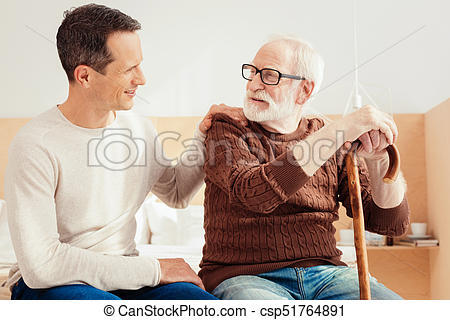

AND THIS is putting both hands on shoulders-

(So imagine that, but minus how aggressive that looks, and minus one of the people’s arms. Also a whole lot less tense/intense.) (Anyway. Moving on.)
-at “thou shalt find a dearer father in my love” (...cue me googling “how on earth do fathers show affection?” Because I really want to get the point across that edmund’s like “a father figure??? For me???” And Cornwall’s like “👍. A father figure. For you.”) HECK I GOT IT. Hear me out. Cornwall pats Edmund on the head (in like, a fatherly way), and with the other hand hold The Letter (TM) (even though this is a different “the letter”) and looks it over. This is the first time he looked away from Edmund since this conversation started. In a way that portrays “yes you are my son now I have claimed you as my own” but also “you are not necessarily my top priority- I can give you the fatherly love and affection you desire, but it’s not exactly unconditional. You did well today, good job! You keep up the good work and I’ll keep up my end of this; ie providing you with the fatherly love you never received in your childhood” ( @suits-of-woe I am trying here. I am struggling. I’m so sorry for ruining the Cornwall Theory like this- I’m trying my best to convey it via my amazing stage directions, but I can see pretty clearly that I’m epically failing at this).
ACT 3 SCENE 7
-Cornwall walks onto the stage first, followed by Goneril and Regan close behind them, and Edmund last.
-at “Farewell, sweet lord, and sister”, Cornwall nods at Goneril in response (this has nothing to do with Edmund, I always just thought it was weird that he doesn’t respond)
- at “Edmund,.. farewell” Goneril had already left the stage, Regan is standing next to Cornwall at the opposite end of the stage. Edmund’s about to exit when Cornwall says “Edmund”. He turns around- expecting Cornwall to say something more to him or something. There’s a pause. Cornwall doesn’t have anything else to say. He just says “Farewell”. Edmund nods and leaves the stage.
ACT 4 SCENE 2
-oh heck I gotta stage an Edmund and Goneril scene now
-I don’t wanna?
(Future Edette Editing: and so I won’t!! I don’t normally describe things as cringe, but that’s what this was. I only put this in because I felt obligated to talk about every scene. Oh well- I guess 4.2 isn’t getting stage directions from me)
ACT 5 SCENE 1
-Edmund enters first, dressed in some sort of military commander uniform. Because. Like. There’s a war going on. His sleeves are rolled up/cuffed up to elbow length, and his arm is still bandaged from when he stabbed it.
-there is a tent with a desk in it on stage. Hold on let me illustrate this:
(Future Edette Editing: yeah there was an illustration here, but I’m changing some stuff so I deleted it)
It’s all on wheels so it can be moved around the stage- whichever piece is the most important to the scene will be more up front.
-Edmund stands at the desk which has some military plans of some sort on it.
-Edmund is armed with a brand new sword (Cornwall’s sword? Maybe? Who knows?) (UPDATE: yeah hi future Edette here- I decided that it is, in fact, Cornwall’s sword)
-With Regan, Edmund also doesn’t get that she’s flirting with him right away.
-and then. Then he’s like “OH WAIT” “WAIT SHE’S FLIRTING” “WAIT SO I GOT 2 GIRLFRIENDS??” “OH WOW THIS IS FANTASTIC” “THIS IS LITERALLY THE BEST WEEK OF MY LIFE” (lol Edmund it’s also the last week of your life)
-he 100% realized at “No, by mine honor, madam”.
-Albany stands at the opposite end of the desk. He never moves any closer or further from Edmund than the opposite end of the desk. Goneril would have moved closer but Albany is blocking her.
-as Edmund leaves he puts on his military commander hat of some sort and adjusts it while looking in a mirror or some other reflective surface. Just to show he’s still the same Edmund from act one- he still cares about his appearance to an extent.
-at “the enemy’s in view, draw up your powers.” Edmund half-jogs in back onto the stage- showing that he wasn’t just commanding the soldiers ( if he was he’d have been walking at a moderate pace), but he was actually with them, to some extent, fighting along side them on the battlefield.
- (Future Edette Editing here: yeah so I deleted the notes on the soliloquy here. I didn’t like them. Oh well.)
ACT 5 SCENE 3
-wow it’s hard to make this Edmund guy redeemable/sympathetic when he kills off Cordelia. Like. He really didn’t need to do that
-why, Edmund. Why must you do this.
-you’re making my job here (ie to make you sympathetic) very difficult.
-ANYWAY. I’ll do what I can for this scene
-The captain here? Yeah, he’s Curan from earlier. Edmund made him a captain. There you have it, Edmund’s one semi-redeeming factor for this scene
-I really don’t know how to have this part play out in a way that makes the audience sympathize with Edmund. This is the best I can do.
(Future Edette Editing: yeah so honestly killing off Cordelia and Lear was a logical and strategic move to make, tbh. ((Not morally fantastic. But logical.)) Because yeah Albany would have left them alive and then what? They’d get the throne? Let’s be real here- the country’s already collapsing- the last thing you need is Lear or Cordelia on the throne. Even *Albany* would do a better job than either of them. And he wouldn’t do anything at all. So. Yeah.)
-I’m so burnt out right now I know this isn’t the quality content you came here for but I don’t know how to get this back on track either. ANYWAY I am dedicated to finishing this. Let’s go! There isn’t much left to the play! I’m almost done!
-at “Sir, by your patience, I hold you but a subject of war..” Albany speaks in a very harsh tone- talking to Edmund as if he were a child who interrupted class for like the eighth time that day. Albany’s just salty that his wife likes Edmund more than him.
(Future Edette Editing: Sorry if this doesn’t flow well here anymore- I deleted a bunch of stuff)
-as the argument continues, Regan and Goneril get more frantic because they see they’re not winning.
-Albany gets louder and angrier because he’s frustrated that his wife likes Edmund more than she likes him. Also because at this point, he pretty much hates Edmund.
-Edmund, however, is the quietest out of all the yelling people around him. He doesn’t like arguments- or rather, he doesn’t like when he’s the one the argument is directed towards. He tries to stay calm and talk in a level voice. As everyone around him argues he tries to step in between them and silently play the role of peacekeeper.
-at “Nor in thine, my lord” Edmund is still calm./ not yelling at him. He says it like he’s stating a fact, not contributing to the argument.
-at “half blooded fellow, yes!” My book’s translation to modern english say “Bastard, it is!”. And like. No one’s called him a bastard for like 4 whole acts now. All I have to say to this is Big Oof. (Is that a dead meme? Yeah. Probably.) Edmund is surprised at first- then glares at him- in a way saying “oh? You want to go there? We can go there. I’ll gladly fight you with my own two hands.”
-at “I will mainly my truth and honor” he draws his sword, which I have now decided definitely is Cornwall’s sword. Why does he have it? Idk, Regan probably gave it to him.
-As Edgar and Albany talk before the fight, Edmund swings his sword at nothing in particular- the way you’d see people warming up for a fight. This sword is not a two handed sword, so he’ll be fine even with his stabbed arm. As I mentioned earlier, he stabbed his non-dominant arm, so his sword arm is fine.
-at “In wisdom I should ask thy name..” he does something to indicate that he might know it’s Edgar. What does he do? I don’t know. Something with a whole lot of ✨symbolism✨. I’ll figure it out before posting this. Or maybe I won’t. (Future Edette Editing: Yeah so I figured out what to do here slightly after, and I have a whole post about it- but to sum it up, he looks at the *mysterious masked man*’s sword (which as you may recall was his). And he’s like “oh. Oh. Ok then.”)
-they fight. Edgar (as I previously mentioned) is using the sword Edmund gave him at the beginning. Edmund is using Cornwall’s sword.
-As they fight it’s clear that they’re pretty evenly matched. (I mean. Then again, Edmund was just helping in battle like two seconds ago while Edgar was just chilling with his half dead/dead father. So. Edmund’s trying to win a duel after just doing a bunch of exhausting physical activity while Edgar is not.) (Edmund would win if they were fighting when they were both at their strongest)
-(I’ve mentioned this in a previous post, but I’m gonna restate it so that you don’t mess up on how you imagine the fight going down. There’s only one valid interpretation of it, and it’s my own interpretation. That has literally never been used in any production. Yup. That’s the only valid way to imagine the duel.) ANYWAY. As they fight, Edmund seems to be about to win, when Edgar hits his already stabbed arm. Edmund loses focus in that one moment, because. Like. That’s painful. (I was gonna say he drops his sword, but does he? Does that work? I don’t know. If he does or doesn’t, it’s valid either way). Then Edgar stabs him. With is kinda even more painful, and somewhat fatal.
-After he’s stabbed, some random soldier brings him to the tent toward the back of the stage, where he stays until he’s brought off stage
Here’s an illustration to help you picture this:
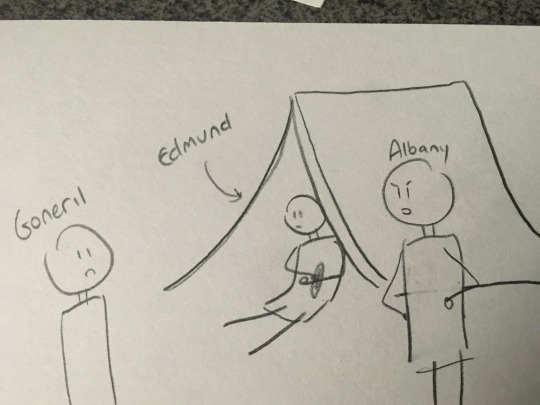
-Edmund is more focused on his wound than the conversation. His tone and body language for the rest of the play conveys “You won! I lost! I’m sorry! Can I get medical attention now??”
-Headcanon that Edmund would have lived if he would have gotten some medical attention sooner
-at “yet Edmund was beloved” he does a little sarcastic laugh (not like a laugh laugh, more like a cynical nose exhale?)- he sees the irony of how all three of them trying to take their rightful power, and all dying at the same time as a result of it.
-while Edmund tells them they still have time to save Cordelia, he sinks down/lies down. He already accepted the fact that he’s going to die.
-while he’s delivering this news, Edgar and Albany look at him in shock and then at each other. From there to the rest of the scene, no one looks at Edmund again. Not because they don’t like him, just because they find him irrelevant now (which Albany outright states a few lines from here).
-When Albany tells the soldiers to take Edmund off the satge/away from there, he doesn’t look at Edmund, he just vaguely motions to him.
-At “Edmund is dead, my lord” “That’s but a trifle here”, Albany barely turns to look at the messenger. He doesn’t care that Edmund is dead. No one does. The wheel has come full circle. No one cared about Edmund at the start, and he’s just as irrelevant now. Edmund wanted to be something to people. He would have wanted them to react to his death. If they had celebrated it, he would have been happier than if they ignored it. He doesn’t even get that much.
-The Curtains Close. The Play Is Over-
#king lear#shakespeare#Do you know how many HOURS went into this??#...because I don’t#I genuinely have no idea how many hours went into this#I was studying for midterms at the same time as writing this#so the hours spent on this and this alone were probably around 5?#5 hours sounds legit
73 notes
·
View notes
Text
Windows
If you’ve ever stayed in a European youth hostel, you can picture the kind of room I’m in right now. It’s windowless and Spartan: twin beds, lumpy pillows, an ancient phone on a beat up nightstand between the beds. It’s cold in here because the air is cranked up too high, but there’s no thermostat. There’s also no clock. Time doesn’t matter here, and time also matters a great deal. The main difference between this room and a room at a cheap pensione in Florence is that when you step outside you’re not greeted by the picturesque banks of the Arno. This room is one of the two “sleeping rooms” in the Neonatal Intensive Care Unit at Providence Pavilion for Women and Children in Everett, Washington, and I’m here because my baby is across the hall, hooked up to machines.
I was 35 weeks and 5 days pregnant when I woke up at 1:18 am.
“My water just broke,” I said to Flo, and my heart sank. They had told me several days prior that I should “chill out” and “take it easy,” when I visited labor and delivery to talk about the symptoms I was having, which felt suspiciously like pre-term labor. I did do things differently: I stopped going to the gym. I started doing dishes while sitting on a bar stool (for what it’s worth, we should all be doing this. It’s comfortable.) But at the same time, a small voice inside me was egging me on: reminding me to finish little tasks, to tidy up loose ends. By Saturday, I was walking through Safeway with Ladybug slower than I’ve ever walked anywhere. I almost could have predicted I’d go into labor that night. But I was at the grocery store, because we needed milk. (It’s currently turning into yogurt in the fridge. Turns out, we’d never drink the milk after all.)
Regardless, there I was at 1:18 am, trying to be clearheaded about what to do next. I packed a few things (real talk: mostly snacks) and tried calling a couple of friends before realizing that Ladybug would be joining us at the hospital. Unsurprisingly, she was thrilled. She had already packed a bag in case she needed to stay at a friend’s house. But staying at the hospital? Even better. (The next morning she did head to a friend’s for the day, and stayed there that night as well. I’m all for including the family in life events, but I don’t need to be managing a five-year-old between earth-shattering contractions.)
Earlier that week I had gotten a pregnancy update email (baby was the length of a head of Romaine lettuce at that point, I think) which highlighted the need to map out the best route to the hospital. Flo and I giggled about this, thinking back on our interminable drives to and from UCLA Medical Center as we waited for Ladybug to arrive. To get to PeaceHealth Ketchikan, by contrast, the directions were straighforward: turn left out of driveway. Turn right on Carlanna Lake Road. Turn left into the ER. It took us a minute and a half to get there from our house, where we parked steps from the entrance of the ER by a sign that said “Reserved for Patients.”
I will not bore you with my birth story. Was it Chekhov who said, “Every happy family…?” Forget it, I just googled the phrase and will spare you my version (it’s Tolstoy, by the way. Also Russian, so arguably I was close.) “All happy families are alike; each unhappy family is unhappy in its own way.” This is true for childbirth too. Every birth story is unique and gnarly and often funny, and the ones that go haywire are unhappy in their own ways. But if you’ve heard one birth story you kind of get the idea: the built-in spoiler alert is that it ends with the birth of a baby. As wild as the story may be, the ending is almost universally the same. All I will say is that Flo and I were holding our son at 5:43 pm, sixteen hours after we packed up our little bag and our little girl and left for the hospital. I am in love with the name we chose for him, but for the purposes of this blog he will be known as Bronson. (Long story. Ask Flo.)
Anyway, in our case it wasn’t labor and delivery that made for the interesting story. A few hours after birth, after the little man had crawled his way up my chest like his sister had done and rooted around for some dinner, the nurses noticed he was struggling to breathe. So began several days of cannulas in his nose to send air more easily to the lungs, and then an IV drip to regulate his blood sugar, and then a 24-hour moratorium on breastfeeding so he wouldn’t aspirate, and then and then and then. In the same way that they say one intervention in labor can lead to a snowball effect, it felt as though Bronson was encountering more and more obstacles day by day. But he seemed well enough by Thursday morning that we were talking about being discharged the next day. Then he stopped breathing. He was in my arms in the tiny nursery—he’d been in my arms most of the night—and he suddenly seemed sleepy. The night shift nurse stared hard at the monitor, adjusting the leads that connected him to it. Within moments, our quiet night together turned loud, bright, busy. A team of nurses, doctors, anesthesiologists, respiratory specialists—they all got to work, drawing blood, inserting a new IV, pumping air back into his lungs. It was quickly decided we would need to be medevaced to to a bigger facility with a proper NICU, which meant Flo raced home to pack me a bag. Ladybug and I cried softly in each other’s arms.
Bronson and I were loaded onto an ambulance, which drove onto the airport ferry, which then headed around the backside of the airport to a police escort and a waiting Lear jet. Bronson’s tiny body was dwarfed by the enormity of his incubator. The kind man who worked for LifeMed and sat next to me on the plane briefed me on flying in a Lear jet: basically, it goes very fast, and might make you sick, and you’ll get there in no time.
The whole time we were in the air, I honestly felt like I was dying. I was semi-reclined (perhaps in a nod to my recently revoked status as a patient.) I couldn’t breathe well, and it felt as though the top of the plane was pressing down on my chest. I stared out the window at the clouds and drifted off, out of exhaustion and terror. I couldn’t see my baby, but partway through the flight, the EMT who was sitting next to him asked for my phone. She took a picture of my beautiful boy, his eyes open and bright. He seemed to be doing better than I was.
We landed in an airfield in Everett and a firefighter walked me to the bathroom in a huge hanger. The whole thing felt so absurd that I wanted to make a joke, but for once in my life I really couldn’t think of anything to say. So I said thank you. En route to the hospital, the ambulance driver pointed through the window at the largest building in the world (so he said); a huge sign on the front of it said Boeing. I felt like I did the first time I stepped off the subway in Tokyo—that everything was big, foreign, pulsing with life in a language I didn’t understand. Bronson had another apnea episode when we arrived at the hospital but I wasn’t there to see it. I had been shunted upstairs to Admitting, where a woman who looked exactly like Iris Apfel spent ten minutes misunderstanding our primary insurance. (I think it’s in the middle of Mr. and Mrs. Smith that Angelina Jolie and Brad Pitt get into an elevator and hear The Girl From Ipanema; after a few seconds of calm and muzak, they get to the next floor and step out, guns blazing. This is what it felt like in Admitting.) Soon, though, I was back downstairs, staring into Bronson’s room as a soft spoken doctor stood next to me and plied me for information about what had happened. I turned to him.
“To be clear,” I said, asking the thing I realized I’d been wondering all day. “This isn’t a question of, ‘My baby may not make it.’ Right…?”
“No,” he said firmly. “He will be fine.”
Still. After my baby settled down for the night, his room buzzing with machines, his body a tangle of wires, I wandered across the hall to the sleeping room and made a few sobbing phone calls. I was decidedly not okay, because I was pretty sure my baby wasn’t either.
That was ten days ago. It’s been two weeks since I glanced around my living room to make sure I hadn’t forgotten anything, turned off the lights and drove away. Two weeks since I wandered the halls of PeaceHealth Ketchikan, looking through the windows at the wintry darkness between mind bending contractions. Two weeks since they said, “Pushpushpushpushpushpush,” and I did and I did and I did and then I held a small red-faced boy in my arms and cried. Two weeks of living in hospitals, he and I — and things seem easier. I chatted with a couple of nurses just now, using words I didn’t know two weeks ago, talking diagnoses and comparing the opinions and temperaments of attending neonatologists. Bronson can breathe on his own, though we’re still figuring out the root cause of his problem, which (it’s becoming clear) may extend beyond his prematurity and into something congenital or structural. Stay tuned; when I know, you’ll know. He’s eating, and sleeping, and pooping, and generally doing all the things babies do.
The other day, Flo smiled a little when he saw the blankets in the sleeping room. (He and Ladybug and my mom are staying at a Hampton Inn a few blocks away, which feels like the premise of a bad sitcom.) “We used to have these blankets in our house,” he said. This baby, our baby, who lives in a crisp clean room in a state of the art hospital — his grandfather raised five children as a single dad cleaning hospitals like this one. Our little guy has his middle name. There’s been so much talk in the last few years about privilege, but I’ve come to realize from this experience that privilege extends beyond race, class, gender, and so much else that we’ve addressed in the conversation. Privilege extends to access. Privilege extends to the ability to be relieved of pain and suffering. (That is, at least as far as medically possible.) Privilege means a shared language, and the ability to speak up for ourselves. Privilege gives us a window to look through: we can choose to see all the beauty others seem to have that we have been denied, or we could recognize the beauty we ourselves have been given that others may not have access to. All we have to do is open the window, and breathe. It’s the breathing, of course, that is the hard part. But we’re working on it.
5 notes
·
View notes